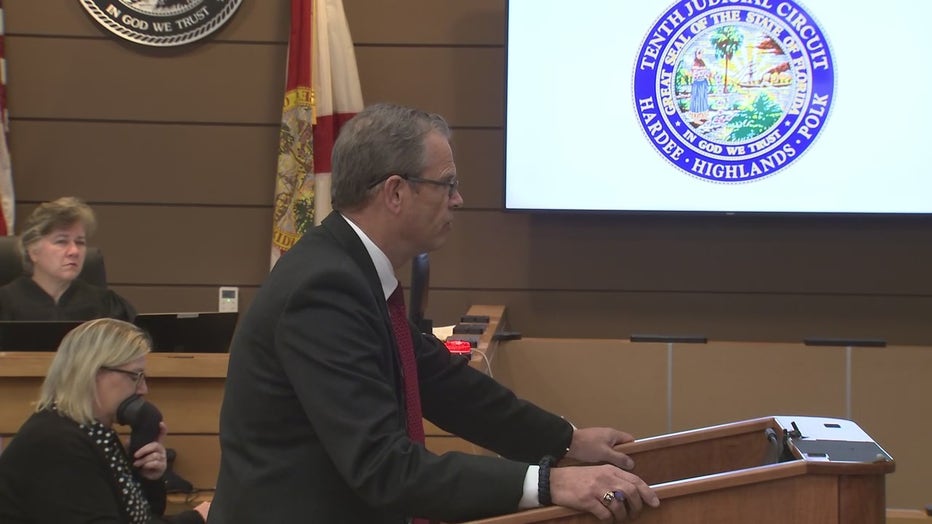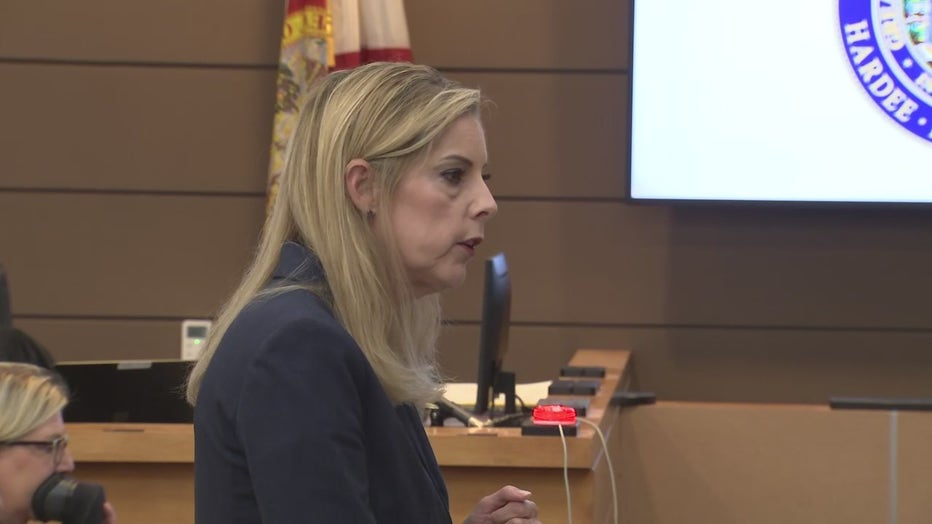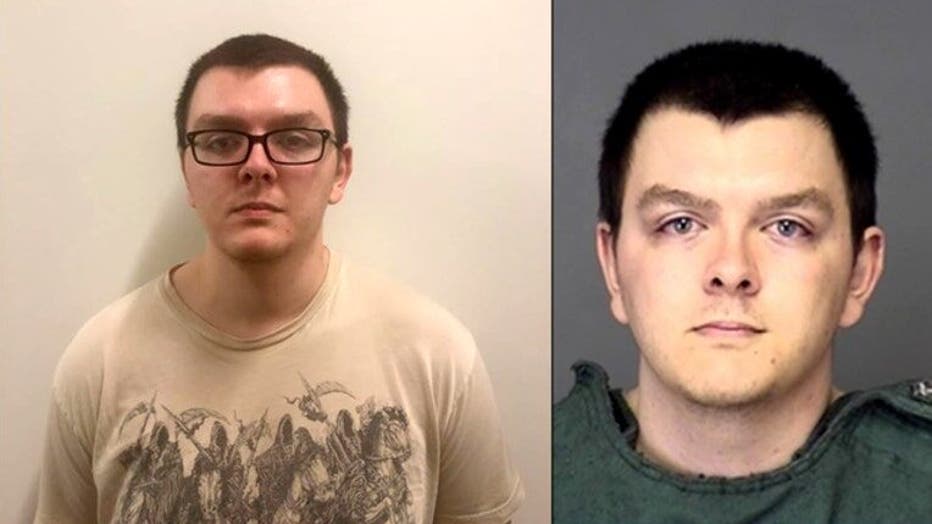Sebring bank shooting: Gunman Zephen Xaver’s fate sits in the hands of the jury
SEBRING, Fla. - After a little more than two weeks of testimony, a Highlands County jury, now made up of 12 jurors, 8 women and 4 men, has begun deliberating in the sentencing trial of Sebring bank shooter Zephen Xaver.
Xaver went into a SunTrust Bank in Sebring on Jan. 23, 2019, and shot and killed five women inside. The jury must now decide if he will be sentenced to death or spend the rest of his life in prison.
Lawyers on both sides in Sebring bank shooter Zephen Xaver’s sentencing trial presented their closing arguments on Wednesday morning before the jury was handed the case. The jurors were told to pack overnight bags because they will be sequestered in a hotel if they do not reach a decision on Wednesday.
Prosecutor Bonde Johnson started his closing argument shortly before 9:30 a.m.
"The defendant wanted to kill, and he did it. So why? Why? You heard the state doctors. There is no tumor, even if there was, it is so small that it is not pressing on anything. There is no tumor, there is no brain damage," Johnson explained.
Johnson walked jurors through a timeline of the shootings on Wednesday, January 23, 2019. He told the jury Xaver had planned to carry out the killings for years in advance.

Prosecutor Bonde Johnson presents closing arguments at Zephen Xaver's sentencing trial.
"All he thinks is blood, death, and murder. You watch each of the victims systematically shot, one by one. I suggest, after the first gunshot, all five of them knew this was not a robbery, and they were all going to die. Each second now becomes an eternity as they wait helpless on the floor. Not knowing when or how they were going to die," Johnson told the jury.
Families of the victims sat in the courtroom as their loved one’s final moments were recounted during the closing statements. A portion of the SunTrust Bank surveillance footage was re-shown to jurors as Johnson continued with his remarks.
"What he wants to do is kill. All the time, these women are wondering what will happen until this moment. Systematically. Murdered, as they cry and ask him why, he continues to shoot. It is heinous, atrocious, and cruel, and it is cold, calculated and premeditated. He looks at his gun again and what he has been able to do," Johnson stated.

Zephen Xaver's defense attorney Jane McNeill gives closing arguments at sentencing trial.
Xaver’s defense attorney, Jane McNeill, asked the jurors to remember why they were chosen to be on the jury.
"If you said every murderer deserved the death penalty, you would not be here. We ask you to honor that promise and that oath to be here," McNeill said.
She asked jurors to decide for themselves on whether Xaver would be sentenced to life in prison or the death penalty.
"Our justice system depends on the courage and independence of jurors. You cannot make this decision based on what the community wants or what anyone else wants, this is your decision," McNeill told the jury.
McNeill said the prosecution has only shown them one part of Xaver and not the whole picture of what drove him to commit the five murders.
"The government has dehumanized Zephen, they show you the video over and over. They want you to see him as a cold, angry murderer. Zephen’s actions at the bank were his own. The government wants to collapse Zephen into that moment in the bank, but they don’t know him. The law requires you to consider his whole life before you make the decision to take his life," said McNeill.
McNeill walked the jury through past testimony from family, friends and teachers who said he was once a young loving child. She said a pattern of dysfunction from family life was the beginning of a shift in his mental health.
"You see that little child has turned into that troubled adolescent," said McNeill.
She also told the jurors that there is no excuse for what Xaver did. However, she wants them to decide to sentence him to life in prison without the possibility of parole, instead of recommending the death penalty.
Who is Zephen Xaver?
Xaver was born and raised in Indiana and spent his childhood traveling back and forth between his mother's house and his father's house.
His mother described him as a typical kid until he became a teenager. However, during the court proceedings, several testified that Xaver had claimed to be suicidal since the age of 9 and homicidal since the age of 12.
He was in regular counseling and had several stays at behavioral health centers.
Former teachers who took the stand during his sentencing trial described Xaver as quiet and well-mannered but recalled him not doing his homework.
Counselors who testified said Xaver was failing all his classes and was expelled from a school for writing a threatening note to a teacher.
Upon enrolling at another school, Xaver made nearly daily trips to the school nurse complaining about being tired and anxious.

Pictured: Zephen Xaver
A former school nurse testified that Xaver told her his morning medication made him sleepy, but others who testified said he liked to stay up all night playing video games.
His former school nurse testified that he was often permitted to take a nap before returning to class.
When he awoke from one of those naps in 2014, he told the school nurse he had a dream in which he barricaded everyone in the school and began killing his classmates.
The school nurse and the guidance counselor alerted authorities and Xaver was taken to a behavioral health center with a police escort.
RELATED: Sebring bank shooting: Gunman’s mother tells jurors he had a dream about a school shooting
He never returned to the school.
That was not the first time Xaver had been to a behavioral health center.
Witnesses told jurors that Xaver had suicidal and homicidal thoughts and described an incident in which he tried to kill himself with a rope on top of the roof of his father’s home.
Xaver was prescribed medication for depression, anxiety, and sleep. A doctor testified that Xaver was also placed on antipsychotic drugs. However, Xaver’s mother, Misti Hendricks, admitted that she pulled her son off of his medication because she thought he was doing better.
Hendricks also told the jury that she struggled with post-partum depression after giving birth to her second son and was initially misdiagnosed as being bipolar and schizophrenic.
Bank shooter's mother takes the stand
Zephen Xaver's mother told the jury that he had struggled mentally when he was a teenager, but she thought things improved when he moved to Sebring.
Hendricks said she tried everything she could to get Xaver into a residential facility for his mental health issues, but he never qualified.
After leaving school, Xaver signed up for the military but did not disclose his mental health history.
READ: Ex-girlfriend of suspected bank shooter says he 'wanted everybody to die'
He told his mother that he left boot camp because he had a busted eardrum. However, a fellow recruit testified that Xaver told her that he was feeling homicidal. She said she told him to go to the medic because this was not the place for him, and he was discharged.
Sebring bank shooting
Xaver moved to Sebring, Florida, and moved in with his mother and her boyfriend in 2018. He got a job as a corrections officer trainee at the Avon Park Jail on Nov. 2, 2018. He quit his job on January 9, 2019, around the same time his mother drove him to buy a gun.
Hendricks testified that her son told her on Jan. 22, 2019, that he was starting a new job the following day and seemed excited about it.
However, on Jan. 23, 2019, Xaver, who was 21 at the time, donned a bullet-proof vest, walked into the SunTrust Bank located along U.S. 27, south of Lake Jackson, and forced five women inside to lock the doors and lie on the ground as he shot and killed them one by one.
After the murders, Xaver called 911.
Sebring shooting trial: 911 call played for jury
Listen to the 911 call Zephen Xaver made after he killed five women inside a Suntrust Bank in Sebring in January 2019.
After being on the phone with the 911 operator for nearly 45 minutes, a crisis negotiator spent more than an hour talking with Xaver before a SWAT team entered the bank and he surrendered.
Investigators say Xaver did not rob the bank and the killings appeared to be completely random.
Sebring bank shooting: Xaver's recorded interview with police
Listen to a portion of an interview between a lieutenant with the Sebring Police Department and Zephen Xaver about what happened before, during and after the Sebring bank deadly shooting. [WARNING: This contains offensive language].
Who were the Sebring bank shooting victims?
Marisol Lopez, Jessica Montague, Debra Cook, Ana Pinon Wiliams and Cynthia Watson were killed execution-style by Xaver on Jan. 23, 2019.
Several jurors wiped tears from their eyes as Xaver sat stone-faced with his head propped in his hand.
Emotional impact statements from loved ones in deadly Sebring bank shooting
Loved ones of people killed in the bank shooting in Sebring several years ago gave impact statements Friday at the sentencing trial for the killer. FOX 13's Kimberly Kuizon reports.
A sixth person was inside the bank at the time of the killings. Former bank teller Benjamin Wysokowski told jurors he was eating lunch and watching YouTube videos in the breakroom when he heard the gunshots go off.
He said he ran out the back door and through the woods, leaving his cell phone behind. He eventually made it to a nearby home and the homeowner called the police.
Bank teller testifies in Sebring shooting hearing
As Zephen Xaver waits to find out whether he’ll be sentenced to death for killing five people at a bank in Sebring in 2019, a teller at the bank who managed to escape testified Tuesday.
Sebring bank shooter’s sentencing trial
Initially, Xaver pleaded not guilty and requested a jury trial. However, he later changed his plea to guilty in May 2023 and wrote an apology note. State prosecutors are seeking the death penalty.
Since he had already pleaded guilty to the murders, Xaver did not get the jury trial he originally wanted. Instead, there will be a sentencing trial and a jury will decide whether he gets life in prison without the possibility of parole or the death penalty.
After two weeks of testimony, both sides rested their case. However, state prosecutors are expected to call rebuttal witnesses on Monday and closing arguments are slated to begin on Tuesday.
Xaver’s attorney has called for a mistrial several times over alleged jury misconduct, a therapy K-9 in the courtroom, and a dirty look a gun shop employee gave Xaver when he entered the courtroom. All of the motions for a mistrial were denied.
During the defense's opening statement, Xaver's lawyer said that the evidence they will present this week is not an excuse or a justification for him shooting and killing five women at the SunTrust Bank, because there is no excuse.
However, the defense is arguing that Xaver’s life should be spared, and jurors should sentence him to life in prison without the possibility of parole.
Xaver's attorneys called witnesses who testified that he had a brain tumor, suffered from mental illness and was physically and mentally abused by his father.
The jury, which was initially made up of 14 people, is down to 12 after one suffered a medical emergency and another had to tend to a spouse who had a medical emergency.
Death penalty
Xaver’s trial is one of the first high-profile cases in Florida where the death penalty sentence no longer hinges on a unanimous jury verdict.
Florida lawmakers made the change in 2023, shortly after jurors spared the life of the Marjory Stoneman Douglas school shooter in a 9-3 decision.
Florida law now states that a defendant may be sentenced to death if at least 8 of the 12 jurors recommend execution.
State Attorney Brian Haas says all five of the victims‘ families support seeking the death penalty in this case.
SIGN UP: Click here to sign up for the FOX 13 daily newsletter

